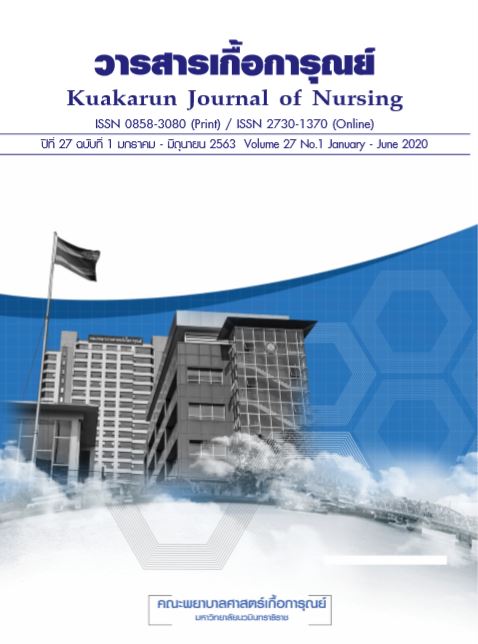การศึกษาพยาบาลด้านการดูแลแบบประคับประคอง
คำสำคัญ:
การดูแลแบบประคับประคอง, การศึกษาพยาบาลบทคัดย่อ
การวิจัยเชิงพรรณนานี้มีวัตถุประสงค์เพื่อศึกษาการจัดการเรียนรู้ด้านการดูแลแบบประคับประคอง และเพื่อศึกษาความแตกต่างของความพึงพอใจของผู้บริหารหลักสูตรและอาจารย์ผู้สอน ในผลลัพธ์ของ การจัดการเรียนรู้ด้านการดูแลแบบประคับประคอง กลุ่มตัวอย่างเป็นอาจารย์จากสถาบันการศึกษาพยาบาล ที่ผ่านการรับรองจากสภาการพยาบาล จำนวน 82 แห่ง แบ่งเป็น 2 กลุ่มคือ 1) ผู้บริหารหลักสูตร และ 2) อาจารย์ผู้สอนหรืออาจารย์ประธานวิชาที่มีเนื้อหาการดูแลแบบประคับประคอง เครื่องมือที่ใช้ในการ วิจัยเป็นแบบสอบถามประกอบด้วย 3 ส่วน 1) ข้อมูลของหลักสูตรและการจัดการเรียนรู้ 2) ความพึงพอใจ ของอาจารย์ในผลลัพธ์ของการจัดการเรียนรู้ด้านการดูแลแบบประคับประคอง และ 3) คำถามปลายเปิด ที่ถามเกี่ยวกับเนื้อหาสาระสำคัญในการจัดการเรียนรู้ด้านการดูแลแบบประคับประคอง เครื่องมือวิจัย ผ่านการตรวจสอบความตรงของเนื้อหาจากอาจารย์พยาบาลจำนวน 5 ท่านซึ่งมีประสบการณ์การสอน ด้านการดูแลผู้ป่วยแบบประคับประคองมากกว่า 5 ปี และนำไปทดลองกับอาจารย์พยาบาลที่ไม่ใช่ กลุ่มตัวอย่าง จำนวน 30 ราย โดยได้ค่าความเชื่อมั่นโดยใช้สัมประสิทธิ์แอลฟ่าของครอนบัคเท่ากับ .72 ทำการเก็บรวบรวมข้อมูลด้วยการส่งแบบสอบถามทางไปรษณีย์ จำนวน 164 ชุด ไปยังสถาบัน การศึกษาพยาบาลจำนวน 82 สถาบัน ๆ ละ 2 ชุด ได้ข้อมูลที่สมบูรณ์จากกลุ่มตัวอย่างจำนวน 94 ราย คิดเป็น ร้อยละ 57.32 การวิเคราะห์ใช้สถิติ ร้อยละ ค่าเฉลี่ย ส่วนเบี่ยงเบนมาตรฐาน และสถิติการทดสอบค่าที
ผลการวิจัยพบว่า การจัดการเรียนสอนเกี่ยวกับการดูแลแบบประคับประคองในด้านเนื้อหาที่ สอนในภาคทฤษฎีมากที่สุดคือ เรื่องการประเมินความปวดและจัดการความปวด จำนวน 64 ราย คิดเป็น ร้อยละ 68.09 และภาคปฏิบัติมากที่สุดคือ การมอบหมายเป็นรายกรณี และการอภิปรายกรณีศึกษา จำนวน 68 ราย คิดเป็นร้อยละ 72.34 ส่วนข้อเสนอแนะจากคำถามปลายเปิด กลุ่มตัวอย่างจำนวน 26 ราย เสนอให้มีการจัดการเรียนสอนเกี่ยวกับการดูแลแบบประคับประคองทั้งในภาคทฤษฎีและปฏิบัติ อย่างต่อเนื่อง ทั้งในระดับพยาบาลศาสตรบัณฑิต การพยาบาลเฉพาะทาง และบัณฑิตศึกษา และกลุ่มตัวอย่าง ที่เป็นผู้บริหารหลักสูตรและอาจารย์ผู้สอนมีค่าเฉลี่ยความพึงพอใจในผลลัพธ์ของการจัดการเรียนรู้ไม่แตกต่างกัน อย่างมีนัยสำคัญทางสถิติที่ระดับ 0.05
เอกสารอ้างอิง
World Health Organization. World health statistics overview 2019 monitoring health for theSDGs (Sustainable Development Goals) [Internet]. 2019 [cited 2020 May 7]. Available from: https://apps.who.int/iris/bitstream/handle/10665/311696/WHO-DAD-2019.1-eng.pdf?ua=1
Strategy and Planning Division. Public health statistics A.D. 2018. Bangkok: Ministry of Public Health; 2019. (in Thai)
Nilmanat K. Palliative care in Thailand: development and challenges. Canadian Oncology Nursing Journal 2016;26(3):262-64.
Tongprateep T, Naruwat N, Panasakun S, Tipseankhum N, Soowit B. Relationship between knowledge, attitude and spiritual nursing practice of nurses in the medical department. Journal of the Nursing Council 2001;16(4):12-27. (in Thai)
Ferrell BR, Temel JS, Temin S, Smith TJ. Integration of palliative care into standard oncology care: ASCO clinical practice guideline update summary. American Society of Clinical Oncology 2017;13(2):119-21.
Tongprateep T. Education and palliative care. In: Chanchawet L, Sthavor D, editors. Dawn of palliative care in Thailand. Bangkok: Beyond Enterprise Co., Ltd; 2013. (in Thai)
Meeting of the dean and head of the Institute of Nursing Science of the state Under the Ministry of Education together with the Nursing Council. Educational nursing management for the 21st century. Proceedings of the 2013 Annual Conference (Subproject 1). Bangkok: 2014. (in Thai)
Nilmanat K. International perspective palliative care in Thailand: development and challenges. Canadian Oncology Nursing Journal 2016;2(3):262-4.
World Health Organization. National cancer control programs: policies and managerial guidelines. Geneva: World Health Organization; 2012.
Thailand Nursing and Midwifery Council. Educational institutions that teach bachelor of nursing courses that are accredited by the nursing council [Internet]. 2020 [cited 2020 May 5].Available from: https://www.tnmc.or.th/images/userfiles/files/1_1(14).pdf (in Thai)
The Government Gazette. Announcement of the ministry of education criteria for curriculum 2015, book 132, special section 2965 D. 2015 November 13. (in Thai)
Sriviroj W. Principles of learning management [Internet]. 2015 [cited 2020 May 1]. Available from: http://edu.pbru.ac.th/e-media/08.pdf (in Thai)
Sheehan DK. Promoting excellence: graduate education in palliative care [Internet]. 2002 [cited 2017 Sep 6]. Available from: http://www.mywhatever.com/cifwriter/content/41/pe3670.html
Ferrel BR, Malloy P, Virani R. The end of life nursing education nursing consortium project [Internet]. 2015 [cited 2017 Sep 6]. Available from: doi:10.3978/j.issn.2224-5820.2015.04.05
Phungrasami T. Doctor and palliative care training. In: Chanchawet L, Sthavorn D, editors. Dawn of palliative care in Thailand. Bangkok: Beyond Enterprise Co., Ltd; 2013. (in Thai)
World health Organization. Cancer control: knowledge into action palliative care WHO guide for effective programs. Geneva: World Health Organization; 2007.
Copp G. Palliative care nursing education: a review of research findings [Internet]. 2006 [cited 2018 Nov 25]. Available from: https://doi.org/10.1111/j.1365-2648.1994.tb01120
Kittinaowarat S, Nakorn C, Phengjad C. Nursing physical problems common in terminally ill patients. In: Lertsanguansinchai P, Nuchprayoon IS, Chatkaew P, Sittiphan C, editors. End-patient care. Bangkok: Aksorn Samphan publisher; 2007. p. 176-98. (in Thai)
Froggatt K, parker D. care and long-term care for people with dementia in: supportive care for the person with dementia supportive care series. Oxford: Oxford University Press; 2010.
Malloy P. Nursing education. In: Ferrel BR, editor. Textbook of palliative care. 4th ed. New York: Oxford; 2015.
National Committee for the Development of the National Health Development Plan 12. The National Health Development Plan 12 Issue. Bangkok: The War Veterans Organization of the King’s Patronage; 2016. (in Thai)

















